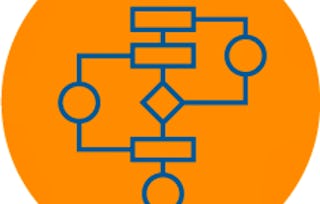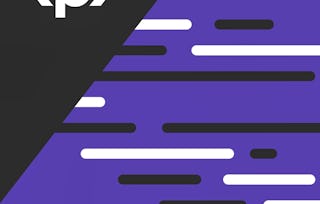Développez les compétences en ingénierie logicielle que vous avez acquises dans "Programmation Java : Résoudre des problèmes avec des logiciels" en apprenant de nouvelles structures de données. Utilisez ces structures de données pour construire des programmes plus complexes qui utilisent les fonctionnalités orientées objet de Java. A la fin du cours, vous écrirez un programme de cryptage et un programme pour casser votre algorithme de cryptage. Après avoir terminé ce cours, vous serez capable de : 1. Lire et écrire des données depuis/vers des fichiers ; 2. Résoudre des problèmes impliquant des fichiers de données ; 3. Effectuer des analyses quantitatives de données (par exemple, trouver des maximums, des minimums, des moyennes) ; 4. Stocker et manipuler des données dans un tableau ou une liste de tableaux ; 5. Combiner plusieurs classes pour résoudre des problèmes plus importants ; 6. Utiliser les itérables et les collections (y compris les cartes) en Java.

Programmation Java : Tableaux, listes et données structurées

Programmation Java : Tableaux, listes et données structurées
Ce cours fait partie de plusieurs programmes.
Enseigné en Français (doublage IA)



Instructeurs : Andrew D. Hilton
166 387 déjà inscrits
Inclus avec
3,210 reviews
Compétences que vous acquerrez
- Catégorie : Algorithmes
- Catégorie : Programmation Java
- Catégorie : Génie logiciel
- Catégorie : Serveurs web
- Catégorie : Cryptographie
- Catégorie : Programmation orientée objet (POO)
- Catégorie : Programmation Informatique
- Catégorie : structures de données
- Catégorie : Fichier E/S
- Catégorie : Cryptage
- Catégorie : Java
Détails à connaître

Ajouter à votre profil LinkedIn
14 devoirs
Découvrez comment les employés des entreprises prestigieuses maîtrisent des compétences recherchées

Élaborez votre expertise du sujet
- Apprenez de nouveaux concepts auprès d'experts du secteur
- Acquérez une compréhension de base d'un sujet ou d'un outil
- Développez des compétences professionnelles avec des projets pratiques
- Obtenez un certificat professionnel partageable

Il y a 5 modules dans ce cours
Bienvenue à "Programmation Java : Tableaux, listes et données structurées" ! Nous sommes ravis que vous commenciez notre cours pour apprendre à écrire des programmes en Java, l'un des langages de programmation les plus populaires au monde. Dans ce module d'introduction, vous aurez une vue d'ensemble de ce cours et vous découvrirez les ressources disponibles.
Inclus
1 vidéo2 lectures
Dans ce module, vous découvrirez les bases de la cryptographie, la science qui permet de préserver la confidentialité et la sécurité des informations. Vous découvrirez les systèmes cryptographiques les plus simples, utilisés depuis l'Empire romain jusqu'au début des années 1900. Vous apprendrez à mettre en œuvre ces algorithmes de chiffrement et à les casser. Pour résoudre ces problèmes, vous travaillerez davantage sur le traitement des chaînes de caractères, mais vous vous familiariserez également avec les tableaux, un moyen de stocker une séquence indexable d'éléments. Vous serez en mesure de (1) combiner des chaînes de caractères à l'aide de la concaténation ; (2) construire des chaînes de caractères dans un programme Java à l'aide de StringBuilder ; (3) utiliser des tableaux pour stocker et manipuler des collections de données ; (4) remanier vos programmes pour améliorer l'organisation à l'aide des principes orientés objet ; (5) et pratiquer la conception d'algorithmes efficaces.
Inclus
21 vidéos5 lectures4 devoirs
À l'issue de ce module, vous serez en mesure (1) de programmer un compteur de fréquence de mots pour analyser n'importe quel fichier texte en entrée, (2) de sélectionner et de substituer des mots d'une liste dans un modèle de document en utilisant à la fois ArrayList et HashMap, (3) de créer de nouvelles listes à utiliser dans des modèles, (4) de reconnaître un code fragile et (5) d'améliorer le code grâce à une conception flexible et orientée objet. Vous acquerrez ces compétences dans le cadre du développement d'une histoire générée aléatoirement que nous appelons GladLibs. Vous découvrirez peut-être que les lions chauves changent la vie des gens ou que les dinosaures en peluche font avancer les choses en un clin d'œil. Nous espérons que vous vous amuserez à développer vos compétences en Java cette semaine !
Inclus
13 vidéos4 lectures3 devoirs
Dans ce module, vous découvrirez comment les journaux de serveurs web stockent des informations sur les visiteurs d'un site web et vous écrirez des programmes pour accéder à des informations telles que l'adresse IP de l'utilisateur, la date et l'heure de l'accès, etc. À l'aide des programmes Java que vous écrirez dans ce module, vous serez en mesure (1) de lire les informations d'un journal de serveur web, (2) de compter le nombre de visiteurs uniques sur votre site web, et (3) de compter le nombre de fois que chaque visiteur utilise votre site web.
Inclus
15 vidéos4 lectures4 devoirs
Dans ce module, vous développerez un programme pour casser le chiffrement de Vigenère, une version plus complexe du chiffrement de César. Vous améliorerez votre programme en trois étapes : d'abord en décryptant les messages dont vous connaissez la langue et la longueur de la clé, puis en ajoutant la capacité de traiter les messages dont la longueur de la clé est inconnue, et enfin en étendant le programme pour traiter les messages dans une gamme de langues possibles. Grâce à ce projet, vous serez capable (1) d'utiliser efficacement HashSet et HashMap, (2) d'étendre un algorithme à partir de la résolution d'un problème plus simple pour traiter des problèmes plus vastes et plus complexes, et (3) de concevoir et de modifier un code de programme impliquant une collection plus complexe de classes, de méthodes et de données.
Inclus
4 vidéos6 lectures3 devoirs
Obtenez un certificat professionnel
Ajoutez ce titre à votre profil LinkedIn, à votre curriculum vitae ou à votre CV. Partagez-le sur les médias sociaux et dans votre évaluation des performances.
Instructeurs


Offert par
En savoir plus sur Développement de logiciels
 Statut : Essai gratuit
Statut : Essai gratuit Statut : Essai gratuit
Statut : Essai gratuit Statut : Essai gratuit
Statut : Essai gratuit Statut : Essai gratuit
Statut : Essai gratuit
Pour quelles raisons les étudiants sur Coursera nous choisissent-ils pour leur carrière ?

Felipe M.

Jennifer J.

Larry W.

Chaitanya A.
Avis des étudiants
- 5 stars
75,09 %
- 4 stars
19,17 %
- 3 stars
3,21 %
- 2 stars
0,96 %
- 1 star
1,55 %
Affichage de 3 sur 3210
Révisé le 19 août 2017
The programming exercises are really interesting! They make programming much more fun to study. The lecturers are all great and the lessons are engaging. Enjoyed it greatly! Thank you Duke.
Révisé le 4 sept. 2020
Learned a lot from the course, but the amount of programming assignment and number of Qs to complete the module (especially week2) was absurdly large. Could be split into separate sessions.
Révisé le 25 nov. 2025
Great teaching, great presentations, interesting and engaging problems, and great assignments that really test your skills. I have been impressed with this course.

Ouvrez de nouvelles portes avec Coursera Plus
Accès illimité à 10,000+ cours de niveau international, projets pratiques et programmes de certification prêts à l'emploi - tous inclus dans votre abonnement.
Faites progresser votre carrière avec un diplôme en ligne
Obtenez un diplôme auprès d’universités de renommée mondiale - 100 % en ligne
Rejoignez plus de 3 400 entreprises mondiales qui ont choisi Coursera pour les affaires
Améliorez les compétences de vos employés pour exceller dans l’économie numérique
Foire Aux Questions
Non. L'achèvement d'un cours Coursera ne vous donne pas droit à un crédit académique de Duke ; par conséquent, Duke n'est pas en mesure de vous fournir un relevé de notes universitaire. Cependant, votre certificat électronique sera ajouté à votre page Accomplishments - à partir de là, vous pouvez imprimer votre certificat ou l'ajouter à votre profil LinkedIn.
Pour accéder aux supports de cours, aux devoirs et pour obtenir un certificat, vous devez acheter l'expérience de certificat lorsque vous vous inscrivez à un cours. Vous pouvez essayer un essai gratuit ou demander une aide financière. Le cours peut proposer l'option "Cours complet, pas de certificat". Cette option vous permet de consulter tous les supports de cours, de soumettre les évaluations requises et d'obtenir une note finale. Cela signifie également que vous ne pourrez pas acheter un certificat d'expérience.
Lorsque vous vous inscrivez au cours, vous avez accès à tous les cours de la spécialisation et vous obtenez un certificat lorsque vous terminez le travail. Votre certificat électronique sera ajouté à votre page Réalisations - de là, vous pouvez imprimer votre certificat ou l'ajouter à votre profil LinkedIn.
Plus de questions
Aide financière disponible,


